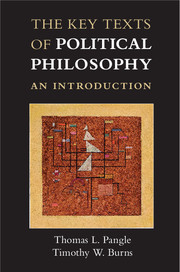Book contents
- Frontmatter
- Dedication
- Contents
- Acknowledgments
- Introduction
- Part I Classical Political Philosophy
- 1 Plato’s Apology of Socrates
- 2 Plato’s Republic, Book One
- 3 Aristotle’s Politics
- Part II Biblical Political Theology
- Part III Modern Political Philosophy
- Part IV Modernity in Question
- Name Index
- Subject Index
3 - Aristotle’s Politics
Published online by Cambridge University Press: 05 October 2014
- Frontmatter
- Dedication
- Contents
- Acknowledgments
- Introduction
- Part I Classical Political Philosophy
- 1 Plato’s Apology of Socrates
- 2 Plato’s Republic, Book One
- 3 Aristotle’s Politics
- Part II Biblical Political Theology
- Part III Modern Political Philosophy
- Part IV Modernity in Question
- Name Index
- Subject Index
Summary
Aristotle (384–322 BC) published dialogues, but they have all been long lost, except for small fragments. What survives of his writings are treatises, based on lecture courses that he gave at his school in Athens called the “Lyceum.” Lectures are of course orations, exercises in rhetoric, and Aristotle’s treatises constitute a magnificent new version of the art of civically responsible philosophic teaching that we have seen displayed and taught by Plato and his Socrates. We have learned from Plato that the first principle of such rhetoric is the realization that the philosopher’s radically skeptical moral questioning is dangerous for lawful society. Aristotle himself stresses that “law has no strength, as regards being obeyed, except habit; and this does not come into being except through length of time” (Politics 1269a20–21; consider the context). Philosophic questioning essentially challenges the moral habituation that is the sole strong basis of lawful society. Responsible public expression of philosophic questioning must therefore be cautiously muted and muffled.
Accordingly, Aristotle begins his Politics in a tone that is anything but skeptical. He starts out making a number of very big claims on behalf of the nobility and the supremacy in rank of politics, as lived in the self-governing, republican city – the polis. He asserts that that city is a “community” (koinonia) whose aim is the most authoritative good, encompassing all other goods of all other communities. (He gives no indication, at the start of the Politics, that the philosophic life and friendship might transcend the city – as he suggests near the end of his Nicomachean Ethics.) No one before or after Aristotle has ever commenced a book by making such enormous claims for the scope and supremacy of politics.
- Type
- Chapter
- Information
- The Key Texts of Political PhilosophyAn Introduction, pp. 67 - 114Publisher: Cambridge University PressPrint publication year: 2014
- 1
- Cited by

